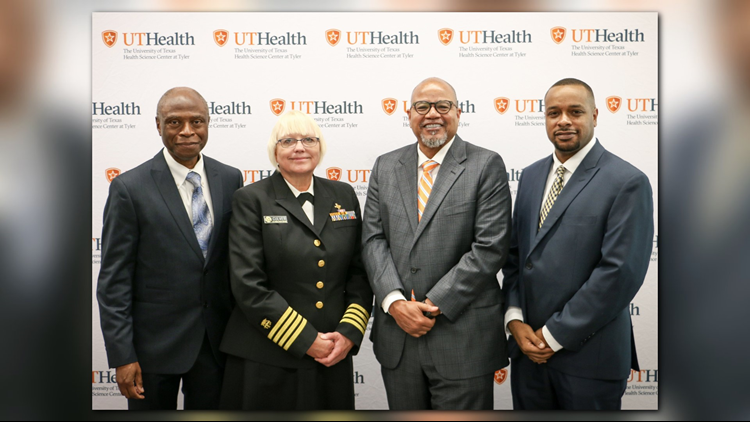TYLER, Texas — The University of Texas Health Science Center at Tyler announced Thursday a three-year award of $750,000 from the Health Resources and Services Administration (HRSA) to establish a residency program in rural Northeast Texas.
Northeast Texas is comprised of 35 counties and is home to 1.5 million people, 58% of whom live in rural areas.
“The health challenges in rural America are clear: rural communities face a greater risk of poor health outcomes than their urban counterparts,” said HRSA Administrator George Sigounas, MS, Ph.D. “Programs like the Rural Residency Planning and Development grants take aim at one of the most persistent disparities: access to high quality healthcare providers. HRSA is committed to increasing the number of providers serving rural communities and improving health in rural America.”
This grant is part of a larger $20 million multi-year initiative by HRSA to expand the physician workforce in rural areas by developing new, sustainable residency programs in family medicine, internal medicine and psychiatry.
The recipients of the awards include rural hospitals, community health centers, health centers operated by the Indian Health Service, Indian tribes or tribal organizations and schools of medicine.
The goal of UT Health Science Center at Tyler’s project is to develop a sustainable, accredited rural training track in psychiatry and to ultimately expand the area’s rural mental health outcomes. With the majority of physicians graduating from residency programs and entering medical practice within 100 miles of their training program, UT Health Science Center at Tyler plans to leverage this trend and recruit graduates of the rural program to enter psychiatry practice in Northeast Texas to serve a community in need.
Within the region, more than half of the counties have no practicing psychiatrist. Reflecting the regional shortage of psychiatrists, Northeast Texas reports an age-adjusted suicide rate of 17.5 per 100,000 population compared to the state suicide rate of 12.2 per 100,000.
By launching the rural psychiatry residency program, access to psychiatric services in the area will immediately increase as patients begin to receive care from psychiatry residents in year one of the program.
“The mental health challenges in this region are very evident," said Dr. Kirk A. Calhoun, president of The University of Texas Health Science Center at Tyler. "Most of our counties do not have access to mental health services; we want to change that. We felt it was very important that we step up and help resolve these problems within our community and the state. Our emphasis on behavioral health has afforded us to become the principal provider for behavioral health services in this region. Now, with the HRSA grant, we are continuing to expand our reach into rural communities to address mental health concerns in a very significant way.”
UT Health Science Center at Tyler was the only institution in Texas to receive the award.
The new rural residency track will begin interviewing candidates in 2020. The new program will be hosted in Pittsburg, where the university has already experienced great success with their residency program for rural family medicine .



